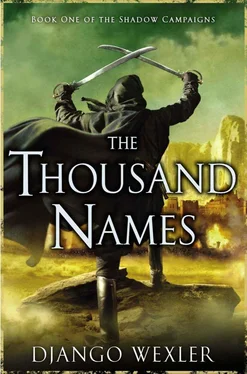Django Wexler - The Thousand Names
Здесь есть возможность читать онлайн «Django Wexler - The Thousand Names» весь текст электронной книги совершенно бесплатно (целиком полную версию без сокращений). В некоторых случаях можно слушать аудио, скачать через торрент в формате fb2 и присутствует краткое содержание. Жанр: Фэнтези, на английском языке. Описание произведения, (предисловие) а так же отзывы посетителей доступны на портале библиотеки ЛибКат.
- Название:The Thousand Names
- Автор:
- Жанр:
- Год:неизвестен
- ISBN:нет данных
- Рейтинг книги:4 / 5. Голосов: 1
-
Избранное:Добавить в избранное
- Отзывы:
-
Ваша оценка:
- 80
- 1
- 2
- 3
- 4
- 5
The Thousand Names: краткое содержание, описание и аннотация
Предлагаем к чтению аннотацию, описание, краткое содержание или предисловие (зависит от того, что написал сам автор книги «The Thousand Names»). Если вы не нашли необходимую информацию о книге — напишите в комментариях, мы постараемся отыскать её.
The Thousand Names — читать онлайн бесплатно полную книгу (весь текст) целиком
Ниже представлен текст книги, разбитый по страницам. Система сохранения места последней прочитанной страницы, позволяет с удобством читать онлайн бесплатно книгу «The Thousand Names», без необходимости каждый раз заново искать на чём Вы остановились. Поставьте закладку, и сможете в любой момент перейти на страницу, на которой закончили чтение.
Интервал:
Закладка:
The Colonials fell on those who were slow, or who’d gotten jammed up with their fellows. Winter stumbled to a halt, sword still raised, and the blue tide washed past her. She watched as brown-coated figures fell, run through from behind, stabbed while trying to crawl away, clubbed down with fists or musket butts. In seconds, there was no one still standing within sight. The rush of men had moved on, chasing the fleeing Khandarai, out the other side of the smoke and across the hill.
Someone grabbed Winter by the shoulder. She spun, sword still in hand, and Graff had to duck to avoid losing an ear.
“Sir!” he said, sounding distant and tinny. “It’s me, sir!”
“Sorry,” she mumbled. Her mouth felt clotted with grit, and she could taste the salty tang of powder. Mechanically, she tried to sheathe her sword, and managed it on the third attempt.
“Are you all right, sir?” When she only looked at him blankly, he raised his voice and said, “Sergeant! Are you all right?”
Some light was beginning to break through the clouds that had enveloped Winter’s brain. She shook her head, trying to clear it, and then at Graff’s look of alarm she raised a hand and said, “Fine. I’m fine.”
Graff grinned and clapped her on the shoulder. “We did it!”
We did? She looked around, blinking. Brown-uniformed bodies carpeted the ground, broken here and there by a splotch of blue. Out in the smoke, the now-silent guns loomed like distant ruins.
“Grayskins look pretty enough, but they haven’t got much of a taste for steel,” Graff said, sounding satisfied.
“Bobby,” Winter said, suddenly remembering. The Lord Above loves irony. “Have you seen Bobby?”
Graff shook his head. “I was at the other end of the line. He’ll be up there with the rest, I’d wager. The young ones always get a little hot-blooded.”
Winter stared into the smoke, in the direction they’d come. The slope they’d climbed was littered with human wreckage. Graff, following her gaze, shifted uncomfortably.
“Come on,” he said. “We’ve got to re-form. This may not be over.”
• • •
But it was. The First and Second Battalions, as Winter had guessed, had had by far the hardest climb. On the flanks, the Khandarai had broken at the first volley, trapped as they were in ineffective squares. Give-Em-Hell’s pursuing horsemen had reaped a rich harvest, and whole companies had thrown down their weapons and surrendered. The survivors-which, they’d learned from prisoners, included General Khtoba himself-showed no sign of halting anywhere short of the city gates. The colonel sent the cavalry to harry them as best they could, and set the rest of the troops to collecting the wounded and preparing the dead for burial.
The boasting and cheers of the men had died away as they clambered down the slope and began the bloody business. Those of the wounded who could still walk, or even crawl, had already made their way back toward the Vordanai camp, so those that remained were either unconscious, dead, or too badly hurt to move. Pairs of soldiers with stretchers came and went nonstop, carrying the badly wounded toward the growing hospital, while other details dragged or carried the dead to be laid neatly at the base of the hill. Still others collected salvageable detritus-muskets, ammunition, canteens, and spare flints. It was a long way to the nearest Vordanai depot, and the colonel had ordered that nothing was to be wasted.
Winter went straight to the spot where she thought Bobby had fallen, but there were so many bodies in blue. It was Folsom who found the boy in the end, curled up like a baby, hands pressed against his stomach. His face was so pale that Winter thought he must be dead, but when Folsom and Graff rolled him onto his back he gave a low groan and his eyelids fluttered. His hands fell limp to his sides, exposing a gory patch on his midriff, his bloody uniform now caked with sticky dirt.
“Hell,” Graff said softly. “Poor kid.” He looked up at Winter, then shook his head. “Better call for a stretcher. Get him to a cutter-”
“No.” The firmness in Winter’s voice surprised herself. “Folsom, help me carry him. We’ll take him back to my tent.”
“What?” Graff narrowed his eyes. “Sir-”
“I promised him,” Winter said. “No cutters. You’ll have to do what you can for him yourself.”
The corporal lowered his voice. “He’s dead, sir. Hit like that, in the bowels, it’ll fester certain as sunrise, even if he doesn’t bleed out.”
Winter watched Bobby’s face. His eyes were screwed tightly shut, and if he’d heard what Graff had said he gave no sign.
“Then it won’t matter if we take him to the cutters or not, will it?” she said. “Do it, Corporal.”
Folsom bent down and picked Bobby up, gentle as a mother handling a babe. Even so, a fresh welling of blood cut through the dirt and washed down the boy’s stomach. Winter bit her lip.
“Sir. .,” Graff said.
“My tent,” she told Folsom. “Now.”
Chapter Thirteen
MARCUS
It was the evening of the third day before the Auxiliaries turned up, and the Old Colonials made good use of the time. The houses closest to the waterfront had loopholes bashed in their walls, other houses were torn down and converted into barricades in the streets and alleys, and the big twelve-pounder cannon were carefully concealed behind screens of debris and thatch. By the third day, Marcus found that his nervousness had faded and been replaced by a kind of excitement. Let them walk into this. We’re ready.
When they did come, they were in a hurry. From his vantage point on the hill, Marcus watched their leading battalion approach the ford in a straggly column of march. He’d held out some hope that they were so poorly informed that they would simply push straight across, but obviously some word had leaked out in spite of his precautions. But, with the sun already setting, either the Auxiliary commander was feeling hasty or else he’d underestimated the size of the force opposing him. Either way, no sooner had the enemy battalion arrived than it formed up into a battle column and splashed into the shallows.
What followed must have been a nightmare for the Khandarai. Marcus had briefed his unit commanders for exactly this situation. No shots were fired until the leading enemy company had come ashore on the near bank. Then the screen of debris was dragged aside to reveal the gleaming muzzles of the scripture-inscribed twelve-pounders. The guns belched smoke and canister shot, sweeping away whole swaths of the lead Auxiliary company and turning the river white with froth halfway out into the ford. At the same time, the hidden Vordanai began a steady rain of musketry on the survivors.
The result was everything Marcus had hoped for. The head of the column dissolved in panic, wounded men trying to get to safety while their unhit comrades scrambled for a way out of the killing ground. There was no cover to be had except directly ahead, where the slope of the embankment offered some shelter against the thunder of the guns, and dozens of the enemy chose to throw themselves under that rocky verge. The rest recoiled out into the river, scrambling out of range of the muskets. The boom of the guns followed them, flailing the water with canister.
Only when they’d nearly gotten out of canister range did Marcus send a messenger to the other half of the battery, three more guns concealed behind a house on the riverbank. These were quickly dragged into position while the guns in the town switched to roundshot, and soon all six pieces were firing in long arcs over the river and into the milling men pulling themselves out of the water on the other side. Leading elements of the second Khandarai battalion had arrived in the meantime, only adding to the confusion. At that range the artillery fire was more galling than devastating, but the gunners bent to their work with gusto and kept it up until both enemy units finally pulled together enough to retreat out of range.
Читать дальшеИнтервал:
Закладка:
Похожие книги на «The Thousand Names»
Представляем Вашему вниманию похожие книги на «The Thousand Names» списком для выбора. Мы отобрали схожую по названию и смыслу литературу в надежде предоставить читателям больше вариантов отыскать новые, интересные, ещё непрочитанные произведения.
Обсуждение, отзывы о книге «The Thousand Names» и просто собственные мнения читателей. Оставьте ваши комментарии, напишите, что Вы думаете о произведении, его смысле или главных героях. Укажите что конкретно понравилось, а что нет, и почему Вы так считаете.











